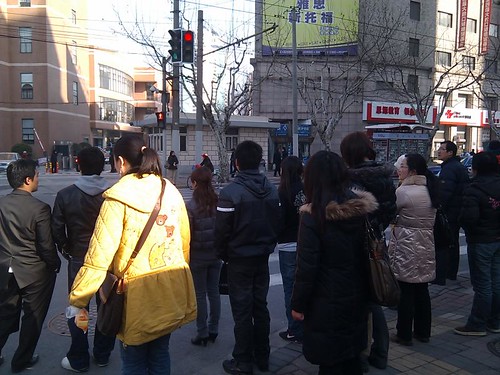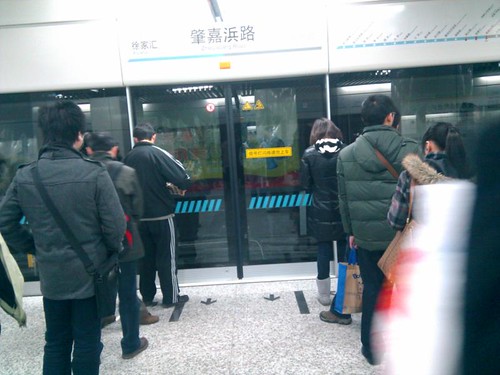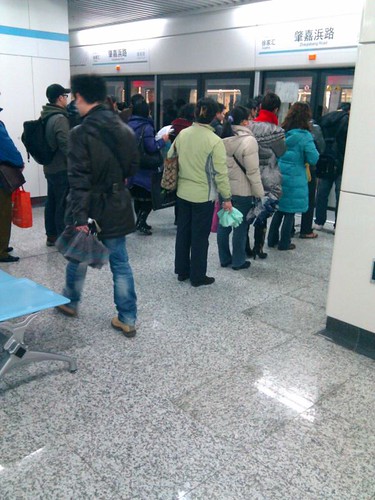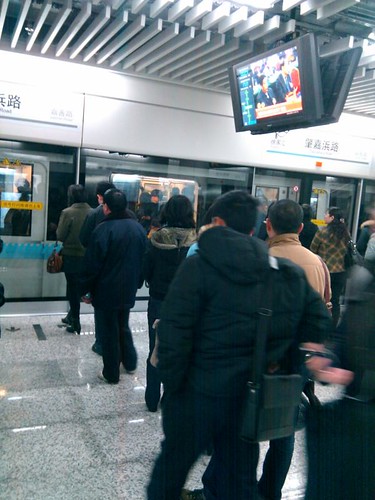When I wrap up my Young Leaders Forum 2007, and the extension trip in Suzhou, Tongli, and Shanghai, I could not help thinking about an important question about the future of China: Are we, as a nation, afraid of grace and beauty?
Here is why I asked this question.
The Beauty of Ancient China
Yong Leaders Forum is a small group of young leaders from all the fields in U.S, and China. It is on two year term that we meet in China (odd years), and America (even years) to discuss U.S. and China relationships and other important things. I am among the 6 representatives from China this year.
The extension trip was as interesting as the main sessions. Since this is in my own country, and I tried to bring my American friends to places I love – like the mid-night tour of Tongli. Many people, especially Ashish, were amazed by the beauty of the water town. It happened again in the Humble Administrator’s Garden in Suzhou.
I am also overwhelmed (again) by the scene of old China. I started to ask the question: Why beautiful things only happens in ancient China? Where are the beautiful places we built recently? Why many building in the recent 50 years are ugly or lack-of-repair?
Suzhou Museum and Guiling Garden
Two places changed my mind. The first is Suzhou Museum. I talked about this place in another blog entry. It is a break-through. I can tell, at least, it costs lot of time to design and construct it. It is beautiful, and expensive.
The other is Guilin Garden.
Thanks for Alex Liu, YLF Fellow 2007, we had dinner in Guilin Garden. That garden was originally the private garden of Huang Jin Rong, and was turned to a public garden. A private equity investor acquired this garden and renovated it and turned it into a very nice restaurant. I was impressed how beautiful an ancient garden can be turned to a great wonder. The new owner brings life back to the gardens. All rooms are lit up, decorated with curtains and paintings. I don’t have pictures, but it gave me the impression that 1930 is back, or 1600 is back to life. The waitresses were trained for 3 months, and they also showed the best of Chinese culture – beautiful, grace, polite, and many characters I only experienced in old novels. Of cause, this does not come without cost. The renovation project costs several million USD. If you look at the history of this garden, the private beautiful garden to bad maintained public park to a decent private garden in the last 100 years seem to be a big circle that it returned to its original starting point.
Whether we should pursuit the luxury like this or not
I may be too quick or too generalized to say that people in China are afraid of beautiful things. This is obviously wrong. Look at the beautiful furnitures, calligraphy, gardens, silk, and millions of great things we created in the past. China is so beautiful (although it takes time for us to re-discover it).
However, nowadays, people still didn’t recover from the lack of (material) resources in the 20th century. People hate luxury things (there are national wide propagandas against being luxurious). The famous saying for socks and cloths are: “New for three years; old for three years; patched and fixed, they last for another three years”. It seems to wear the same socks for 9 years is the virtue of Chinese people. So people face the moral conflict between being grace and beautiful, and saving money.
However, the reality is, much big portion of beauty comes at higher cost than those ugly one. When we have more and more resources, how should we choose? That is a question new generation of people in China has to answer.
JFK’s Answer
This reminds me of something J.F.Kennedy said. It was carved on the wall of the John F. Kennedy Center for the Performing Arts. I happened to took a picture of that wall:

Photograph by Jian Shuo Wang. © 2004. Taken at the south wall of J.F.Kennedy Center for Performing Art.
The first sentence reads:
I look forward to an America which will not be afraid of grace and beauty. — J.F.Kennedy
At the first sight, I felt puzzled. Is there anyone who is afraid of beauty? There are!
We are in a hurry, that we don’t dare to slow down to spend the time to really appreciate the beauty of our life.
We are afraid to put time and effort to make our living environment more beautiful, and healthy.
We are afraid that spending time with fine art is too luxurious.
We are afraid something is too beautiful that may be treated as outrageous.
When we talk about how many hours workers spent to create an ancient garden, we often said it in a negative way – “look at how luxurious the bad guys are!” However, we ignored the fact that really beautiful thing does take time. So the market is full of craps that a worker created in one hour, and very rare can we see some decent art work.
This brings us to the next sentence carved on the wall by J.F.Kennedy:
I am certain after the dust of centuries has passed over our cities, we, too, will be remembered not for the victories or defeats, in battle or in politics, but for our contribution to the human spirit。 — J.F.Kennedy
It was a snowing winter in Washing D.C. Wendy and I just stepped out of the theater after watching the musical of The Thoroughly Modern Millie. At that time, we were touched by the words. He is absolutely right.
A Chinese, which is not afraid afraid of grace and beauty
I believe when people in China end the centuries of hunger, and war, we get back to the original track to pursue happiness, grace, beauty, and all kinds of great things, just as our ancestor did in the last few thousands years.
People in China were not afraid, and will not afraid of grace and beauty.





